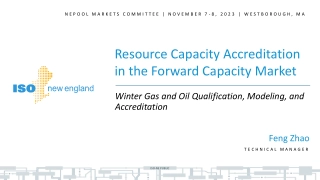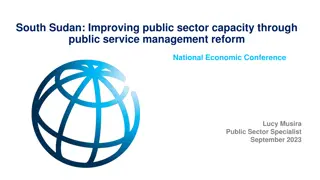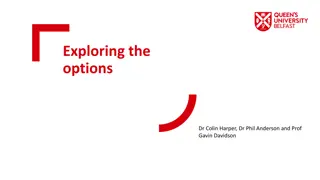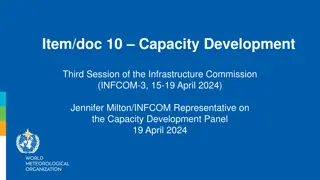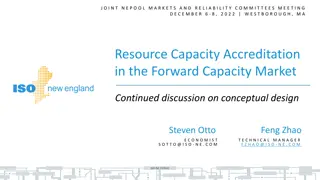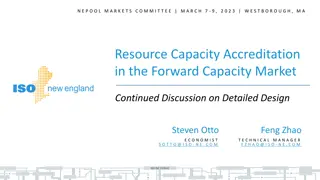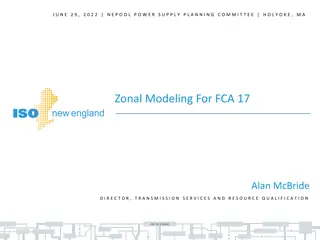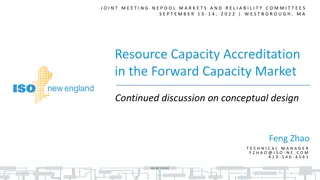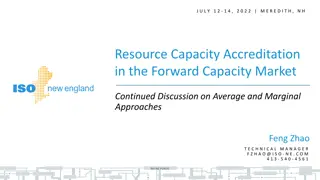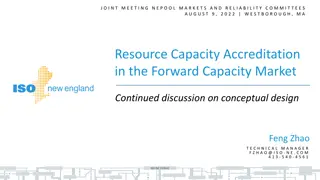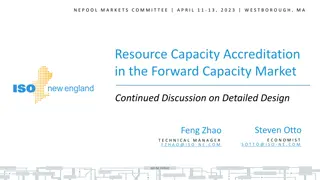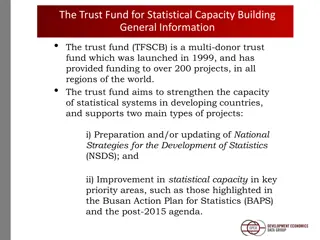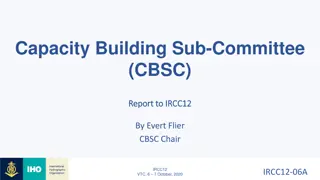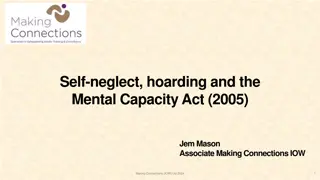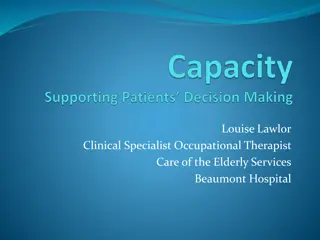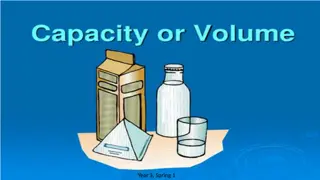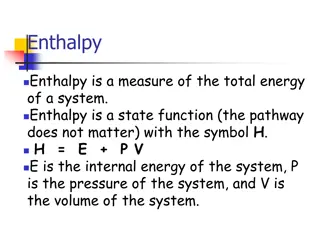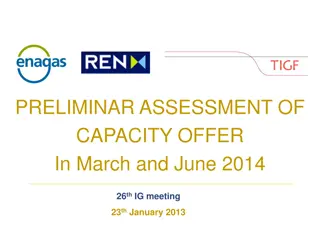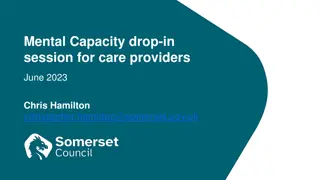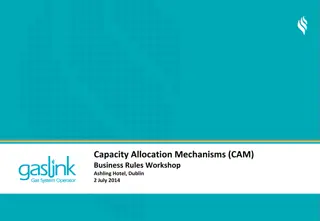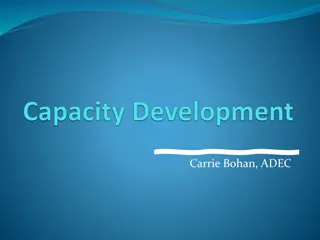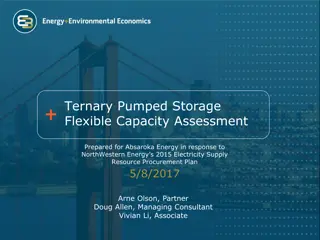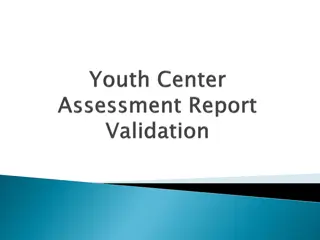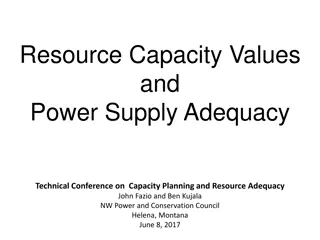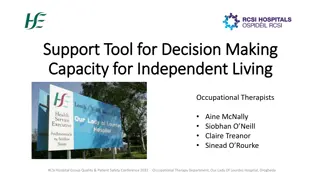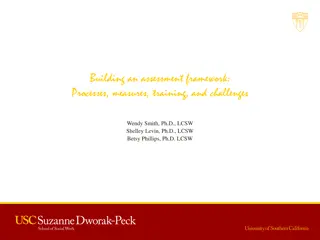Enhancing Public Service Professionalization Through National School of Government Positioning
This presentation outlines the strategic response to public service reform towards professionalization by positioning the National School of Government (NSG) to build state capacity, address deficiencies in various departments, and strengthen governance for effective service delivery in South Africa
0 views • 19 slides
Resource Capacity Accreditation in the Forward Capacity Market
The presentation discusses the Resource Capacity Accreditation (RCA) project in the Forward Capacity Market (FCM) by ISO-NE, aiming to improve accreditation processes to support a clean-energy transition. It emphasizes modeling and accrediting gas and oil resources for resource adequacy as the energ
0 views • 38 slides
Enhancing Public Sector Capacity Through Service Management Reform
South Sudan is working on improving public sector capacity through service management reform, focusing on institutionalizing capacity building, pay and grading, pension support, and strengthening the center of government. Lessons from capacity injection mechanisms and policy frameworks are guiding t
0 views • 16 slides
Global Hydrogen Projects Outlook and Electrolyzer Capacity Analysis
This outlook delves into the IEA Hydrogen Production Projects Database to provide an update on the status of global hydrogen projects. It covers the timing and capacity of new electrolyzer installations, projecting significant growth in electrolyzer capacity by 2030 to meet Net Zero Emissions Scenar
1 views • 16 slides
Exploring Key Distinctions in Legal and Mental Capacity Frameworks
This presentation delves into the crucial distinctions within the legal and mental capacity frameworks, focusing on concepts such as legal personhood, legal capacity, and mental capacity as defined in the MCA (NI) 2016. It explores the implications of these distinctions on decision-making abilities
4 views • 23 slides
Overview of DSW End Point Assessment Team Leader Level 3
DSW End Point Assessment Team Leader Level 3 provides a clear understanding of the assessment process, ensuring individuals comprehend why and when it occurs, responsibilities involved, and how DSW supports them. It covers topics such as what End Point Assessment entails, assessment design and deliv
2 views • 18 slides
INFCOM Capacity Development Initiatives Overview
INFCOM's capacity development initiatives focus on enhancing Earth system observations, closing capacity gaps on weather services, and supporting new opportunities in competencies and capabilities. Collaboration and coordination mechanisms have been established to facilitate sharing of information a
0 views • 11 slides
Joint NEPOOL Markets and Reliability Committees Meeting December 6-8, 2022, Westborough, MA
A meeting discussing Resource Capacity Accreditation in the Forward Capacity Market, focusing on improving accreditation processes to support a reliable transition to clean energy. The presentation outlines the proposed improvements for FCA 19, emphasizing the accreditation of resources based on the
0 views • 81 slides
Resource Capacity Accreditation in Forward Capacity Market Overview
Resource Capacity Accreditation project aims to enhance ISO-NE's accreditation processes in the Forward Capacity Market, supporting a reliable, clean-energy transition. Key concepts covered in this educational presentation include accreditation space, methods, benefits, challenges, and improvement o
1 views • 53 slides
Resource Capacity Accreditation in the Forward Capacity Market Discussion
The presentation discusses improvements in the Resource Capacity Accreditation project of ISO-NE's Forward Capacity Market to support a reliable, clean-energy transition. It includes details on seasonal components, reconfiguration auctions, trading obligations, and stakeholder schedules. Examples pr
3 views • 71 slides
Capacity Zone Modeling for Forward Capacity Auction 17 Results
This presentation unveils the Capacity Zone modeling calculations for Forward Capacity Auction 17 associated with the 2026-2027 Capacity Commitment Period by ISO-NE PUBLIC. It delves into boundary definitions, import-constrained zone modeling, and market rules guiding the assessments and modeling pr
1 views • 16 slides
Resource Capacity Accreditation in Forward Capacity Market Discussions
Discussion on the conceptual design for Resource Capacity Accreditation in the Forward Capacity Market, focusing on improvements to accreditation processes to support a reliable transition to clean energy. The presentation outlines methodologies to accredit resource contributions, commitments to pro
0 views • 34 slides
Resource Capacity Accreditation in Forward Capacity Market Discussion
The Resource Capacity Accreditation project by ISO-NE aims to enhance accreditation processes in the Forward Capacity Market. This presentation reviews key concepts, including nomenclature, Marginal vs. Average approaches, and follow-up items from previous meetings. It emphasizes the commitment to a
0 views • 41 slides
Forward Capacity Market Resource Capacity Accreditation Discussion
Discussion on improvements to resource capacity accreditation in the Forward Capacity Market to support a reliable, clean-energy transition by accrediting resource contributions effectively as the resource mix evolves. Covers conceptual design, stakeholder schedule, and review of proposed enhancemen
0 views • 61 slides
Proposal for Resource Capacity Accreditation in Forward Capacity Market
The ISO-NE has proposed improvements to the accreditation processes in the Forward Capacity Market (FCM) through the Resource Capacity Accreditation (RCA) project. The aim is to enhance the accreditation of resource contributions to ensure reliability during the transition to a cleaner energy mix. T
0 views • 59 slides
Resource Capacity Accreditation in the Forward Capacity Market: Continued Discussion and Detailed Design
The Resource Capacity Accreditation (RCA) project by ISO-NE aims to enhance accreditation processes in the Forward Capacity Market (FCM) to support a reliable, clean-energy transition. This presentation focuses on seasonal components of Capacity Supply Obligations (CSO), Pay-for-Performance (PFP) ob
0 views • 58 slides
The Trust Fund for Statistical Capacity Building
The Trust Fund for Statistical Capacity Building (TFSCB) is a multi-donor trust fund launched in 1999, supporting over 200 projects worldwide to strengthen statistical systems in developing countries. It focuses on national strategy development and improving statistical capacity in key priority area
2 views • 5 slides
Contributions to Capacity Building Initiatives in 2020
The Capacity Building Sub-Committee (CBSC) report highlights the effects of the COVID-19 pandemic on capacity building efforts in 2020. Contributions from various sources like the IHO budget, donations, and support from countries like the Republic of Korea, Japan, and Canada are crucial for empoweri
0 views • 15 slides
Self-Neglect, Hoarding, and the Mental Capacity Act (2005)
Self-neglect and hoarding are complex issues often intertwined with mental capacity challenges. The Mental Capacity Act (2005) outlines capacity assessments, decision-making criteria, and challenges faced by professionals in safeguarding individuals. Recognizing the need for trauma-informed care in
1 views • 16 slides
Legal and Mental Capacity in Healthcare Decisions
Clinical specialist occupational therapist, Louise Lawlor, advocates for patients' rights and decision-making capacity in healthcare settings. She emphasizes the importance of legal and mental capacity in making informed decisions, highlighting relevant legislation, guidance documents, and a functio
0 views • 24 slides
Higher Education Assessment: The Complete Guide
Higher education assessment involves a systematic process of collecting, reviewing, and utilizing information to improve student learning and development. This guide covers the assessment cycle, learning outcomes, the mission behind assessment in higher education, what assessment is and is not, reas
1 views • 36 slides
Capacity and Volume in Practical Settings
Explore the concepts of volume and capacity through engaging activities involving measuring liquid in containers, understanding units like milliliters and liters, and solving capacity-related questions. Discover how to work out different measurements and practice practical capacity in the kitchen wi
0 views • 7 slides
Enthalpy and Heat Capacity in Chemistry
Enthalpy is a measure of total energy in a system, represented as H = E + P.V. Heat at constant pressure relates to enthalpy changes. Calorimetry and heat capacity help measure and understand heat in chemical reactions. Specific heat capacity and molar heat capacity play key roles in determining ene
0 views • 16 slides
Workshop on New Approaches to Statistical Capacity Development in Lao PDR
This workshop, hosted by PARIS21 and UNDP, focuses on enhancing statistical capacity development in Lao PDR. It covers topics like successful capacity development programs, partnerships for national statistics development, and prioritizing needs versus international requirements. The Lao Statistics
0 views • 15 slides
Annual Assessment of Capacity Offer in March and June Auctions
This preliminary assessment evaluates the capacity offers for bundled and unbundled capacity auctions between Spain-France, Spain-Portugal, and Portugal-Spain in March and June auctions from 2014 to 2015. The analysis includes firm annual and quarterly capacity offerings in various flow directions a
0 views • 6 slides
Overview of Environmental Impact Assessment and Strategic Environmental Assessment Directives
Environmental Impact Assessment (EIA) and Strategic Environmental Assessment (SEA) play crucial roles in evaluating the impact of planned activities on the environment. This content delves into the concept, origins, development, and key elements of environmental assessment, discussing the legal fram
2 views • 35 slides
Changes in Capacity Allocation Regulations for Gas Infrastructures in Portugal
The new regulation in Portugal brings significant changes in capacity booking and trading to promote convergence with CAM NC and enable a secondary market. Major changes include ex-ante payment of capacity rights, capacity allocation via a booking platform, and enhancement of liquidity in the second
0 views • 13 slides
Institutional Assessment and Effectiveness Workshop Achievements at SUNY Oneonta
The Office of Institutional Assessment and Effectiveness at SUNY Oneonta has made significant progress in developing assessment protocols and processes, leading to a culture of assessment. This includes completing planning and assessment cycles, establishing objectives and procedures, and aligning u
2 views • 16 slides
The Assisted Decision-Making (Capacity) Act 2015 in the Criminal Justice Context
The Assisted Decision-Making (Capacity) Act 2015 introduces key reforms such as the abolition of wards of court system for adults, a statutory functional test of capacity, new guiding principles, a three-tier framework for support, and tools for advance planning. It emphasizes functional assessment
1 views • 17 slides
Capacity Challenges in Wills: Legal Insights
Testators must possess mental capacity when making a will, as established in legal cases like Banks v. Goodfellow. The common law test for testamentary capacity remains relevant despite the Mental Capacity Act 2005. The Banks v. Goodfellow test outlines the required mental power for making a valid w
0 views • 18 slides
Somerset Mental Capacity Training Session June 2023
This information outlines a mental capacity drop-in session for care providers in June 2023, hosted by Chris Hamilton from Somerset Council. It covers topics like the aim of the Mental Capacity Act, the Somerset mental capacity competency framework, and the importance of staff training. It emphasize
0 views • 21 slides
Capacity and Utilization in Business Processes
This analysis focuses on the capacity and utilization of resource pools in a law firm handling contracts for shopping centers and medical complexes. It breaks down the theoretical flow time, capacity calculations for paralegals, tax lawyers, and senior partners, and the overall process capacity asse
0 views • 8 slides
Capacity Allocation Mechanisms (CAM) Business Rules Workshop Summary
This summary provides insights into the Capacity Allocation Mechanisms (CAM) Business Rules Workshop held at Ashling Hotel, Dublin on July 2, 2014. The workshop covered topics such as CAM business rules scope, key features, auction processes, code modifications, implementation timelines, and consult
1 views • 32 slides
Capacity Development in Water Systems
Capacity development is crucial for water systems to acquire and maintain technical, managerial, and financial capabilities in order to consistently provide safe drinking water. Federal requirements mandate new public water systems to demonstrate capacity, with states required to have strategies to
0 views • 8 slides
Ternary Pumped Storage Flexible Capacity Assessment for Absaroka Energy
The assessment conducted by E3 compares Absaroka Energy's ternary pumped storage technology with conventional resources in terms of their ability to provide flexible capacity. The analysis looks at the cost comparison, system capacity, and ancillary services provided by different types of generating
0 views • 14 slides
Capacity Assessment and Development Plan for Youth Centers in Liberia
The capacity assessment covered various youth centers across Liberia, focusing on organizational, technical, and institutional capacities. The methodology involved mobilizing stakeholders, conducting situational analyses, and developing a capacity development plan. Key findings highlighted governanc
0 views • 21 slides
Resource Capacity Values and Power Supply Adequacy Conference Highlights
Explore insights from the Resource Capacity Values and Power Supply Adequacy Technical Conference, covering topics like integrated vs. standalone capacity values, utilizing hydro storage to increase capacity, and the 2021-22 Adequacy Summary. Learn about the importance of integrated capacity values
0 views • 9 slides
Capacity for Independent Living Capacity for Independent Living
The Occupational Therapy Department at Our Lady of Lourdes Hospital in Drogheda is enhancing their assessment practices for Decision Making Capacity (DMC) in independent living scenarios. Through research, education, and stakeholder collaboration, they aim to streamline assessment processes and impr
0 views • 4 slides
Building an Assessment Framework: Processes, Measures, Training
Constructing a comprehensive assessment framework involves establishing goals, developing assessment tools, analyzing results, and addressing challenges. Key principles include enabling assessment over time, holistic curriculum assessment, and engaging faculty in the assessment process. The framewor
0 views • 14 slides
Legal Elements of Decision-Making Capacity
Legal elements necessary for decision-making capacity including understanding, limits, consent, and episodic capacity assessment. Discusses when consent is required, guardianship legislation, and Tribunal expectations. Clarifies the nature and effect of decisions, voluntary decision-making, and comm
0 views • 11 slides

